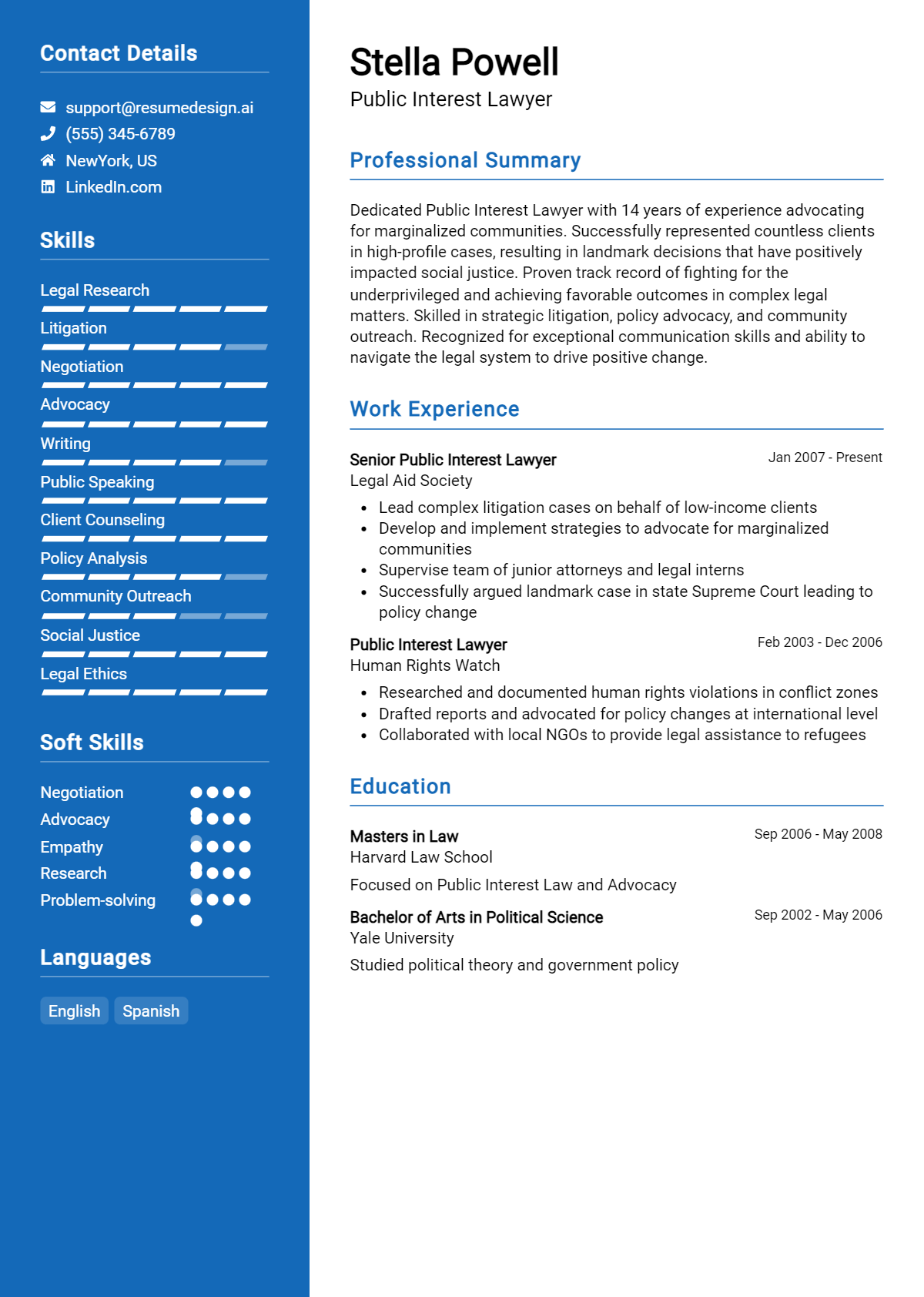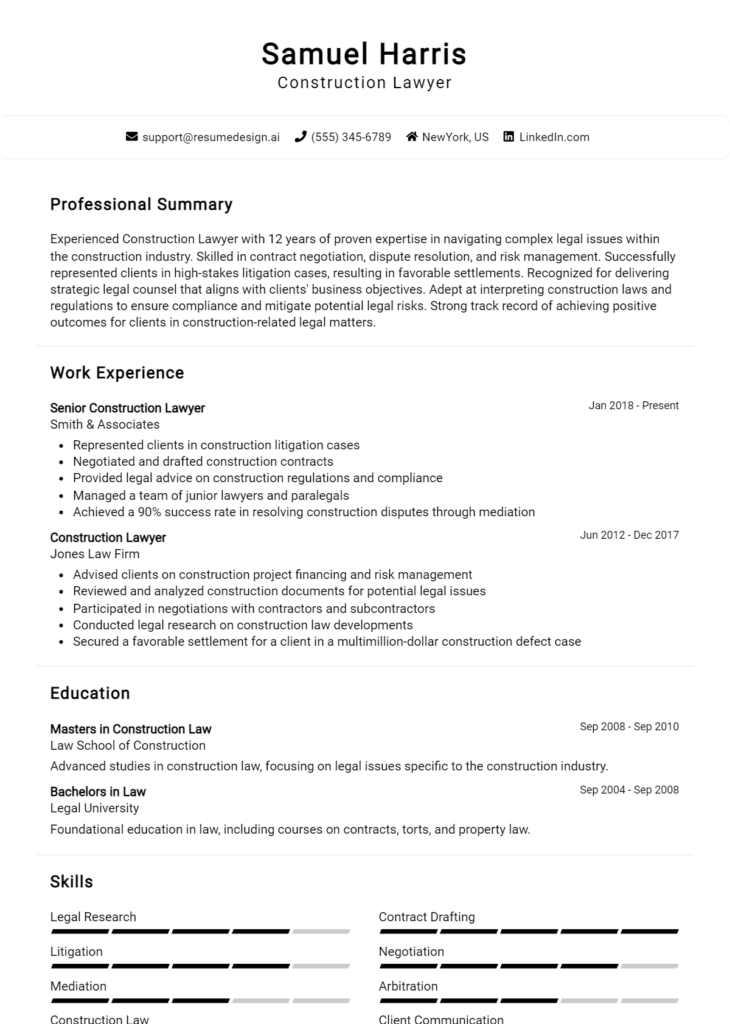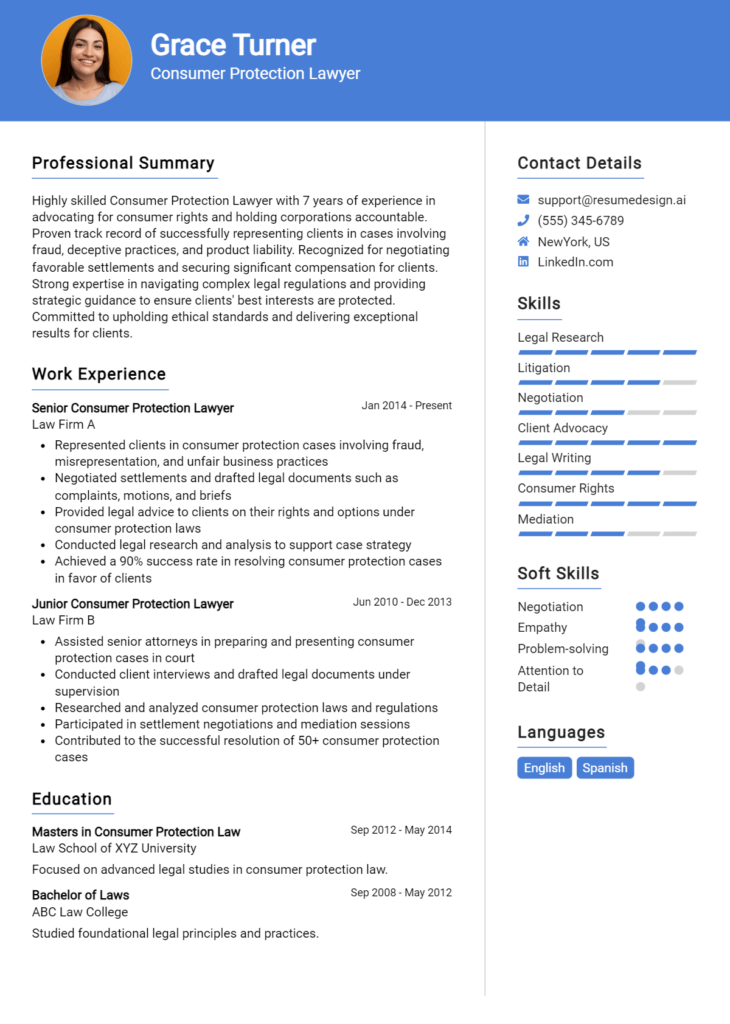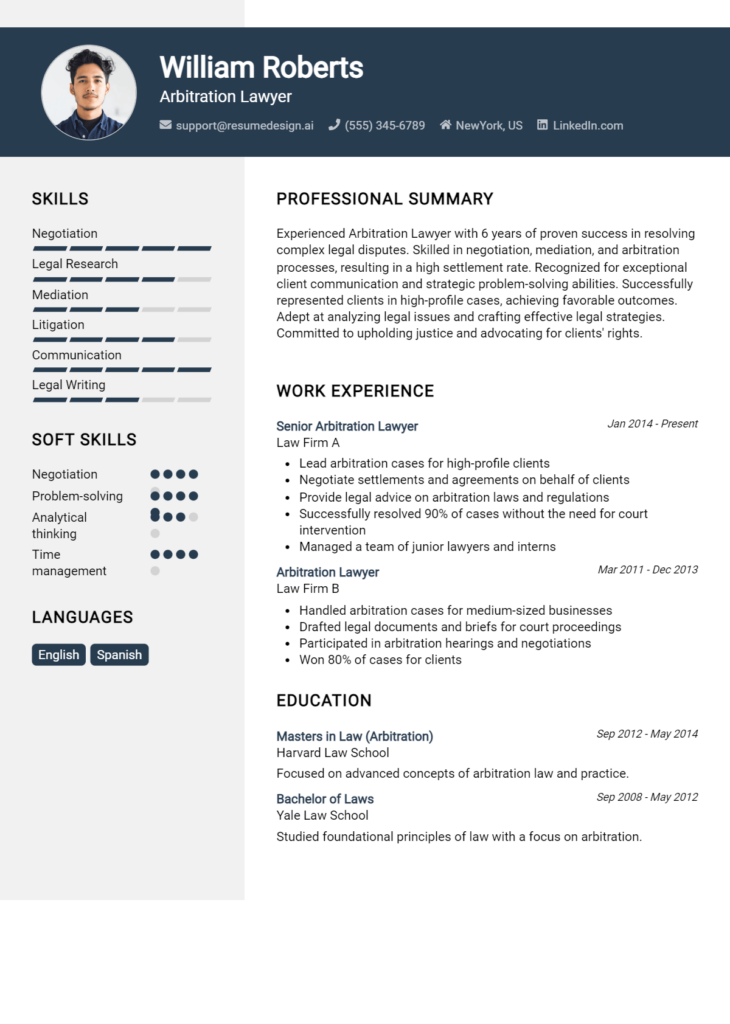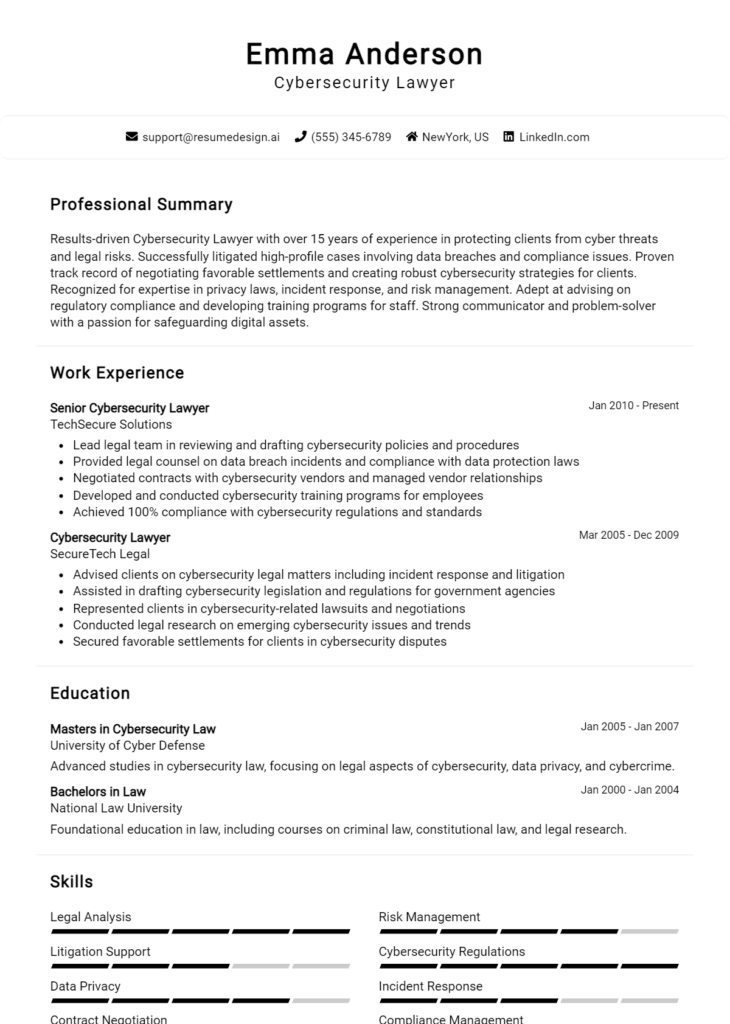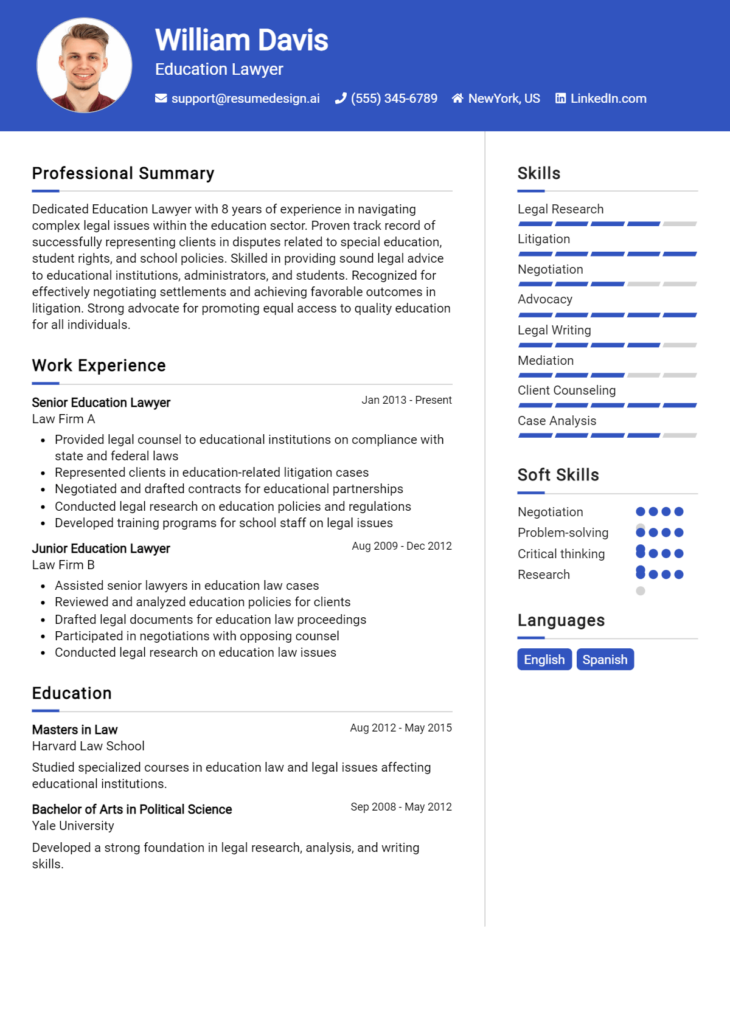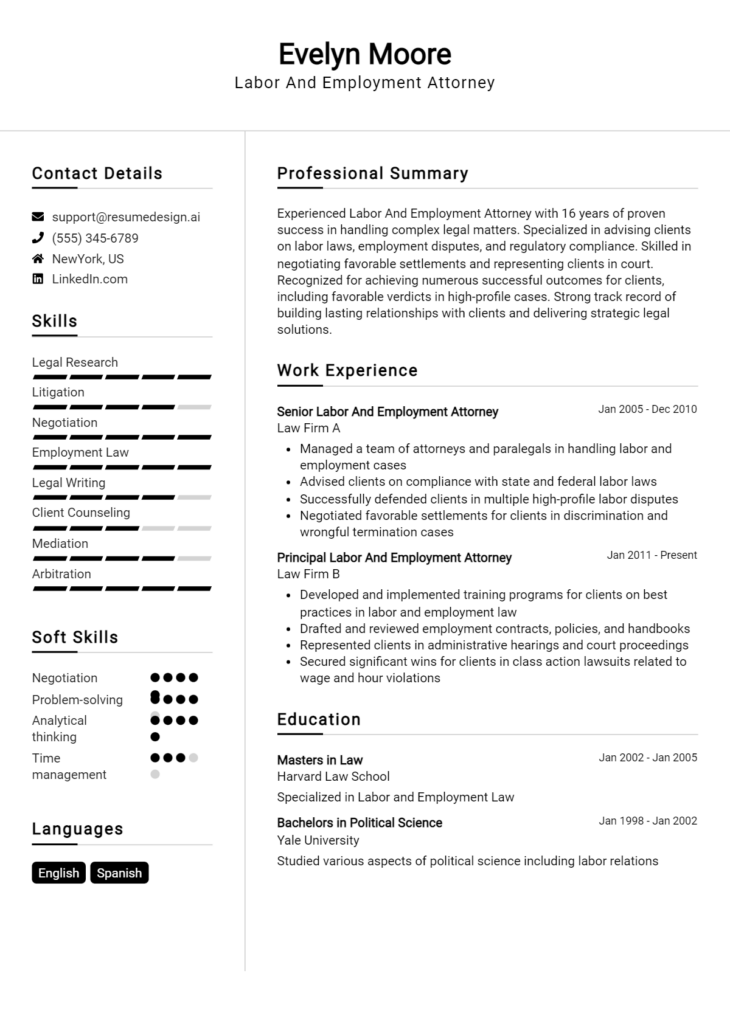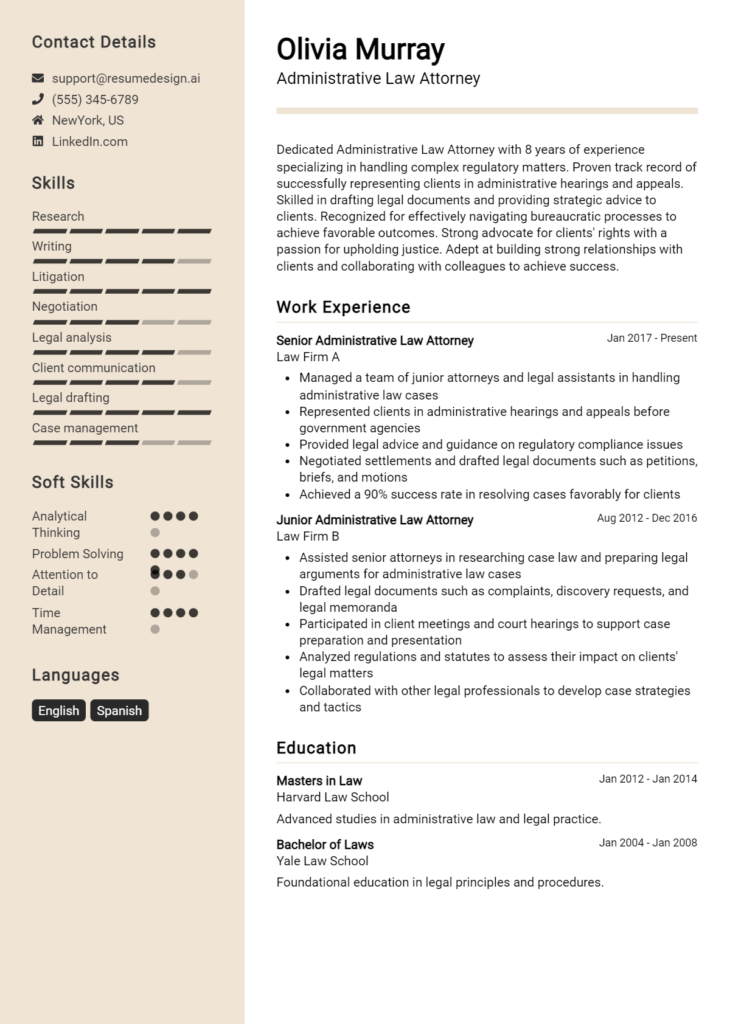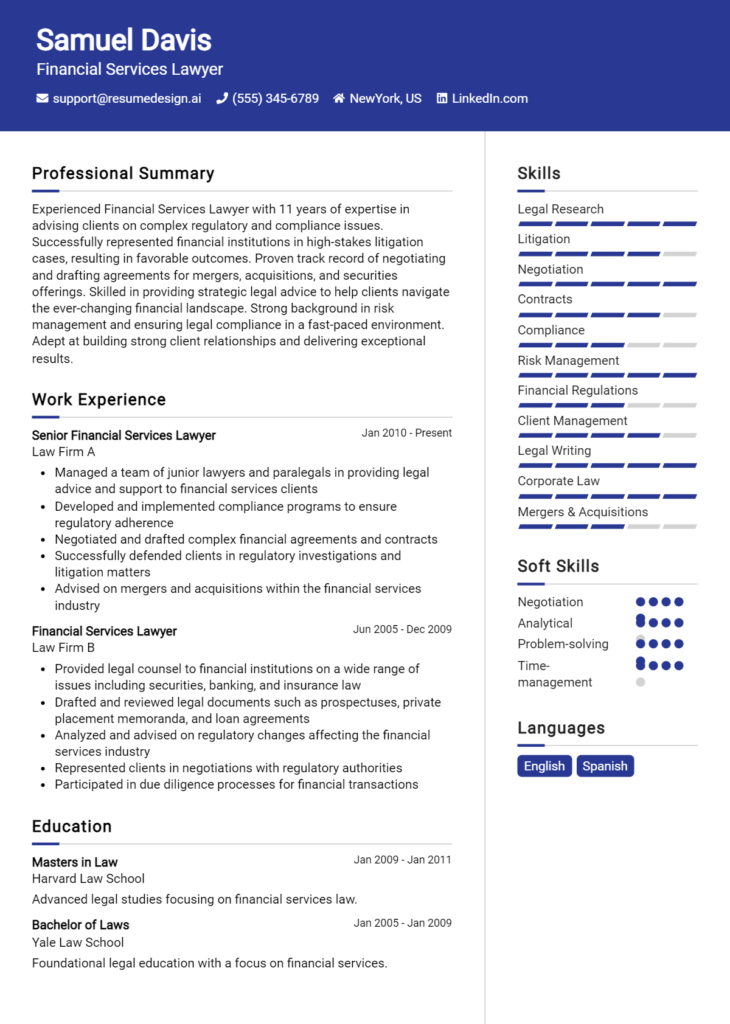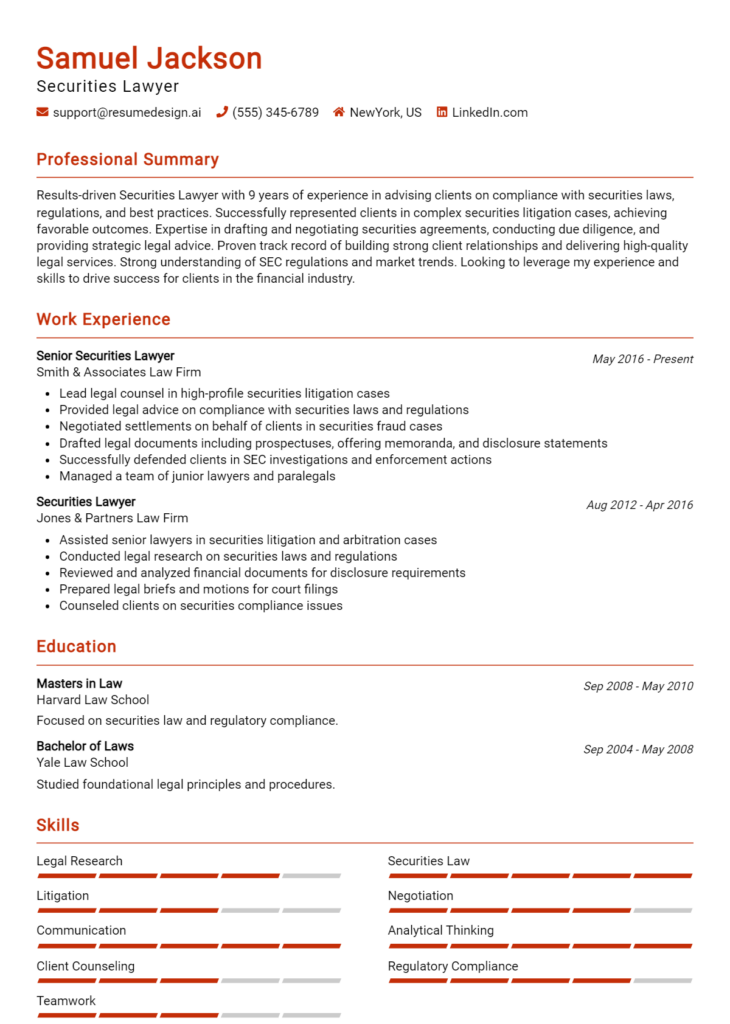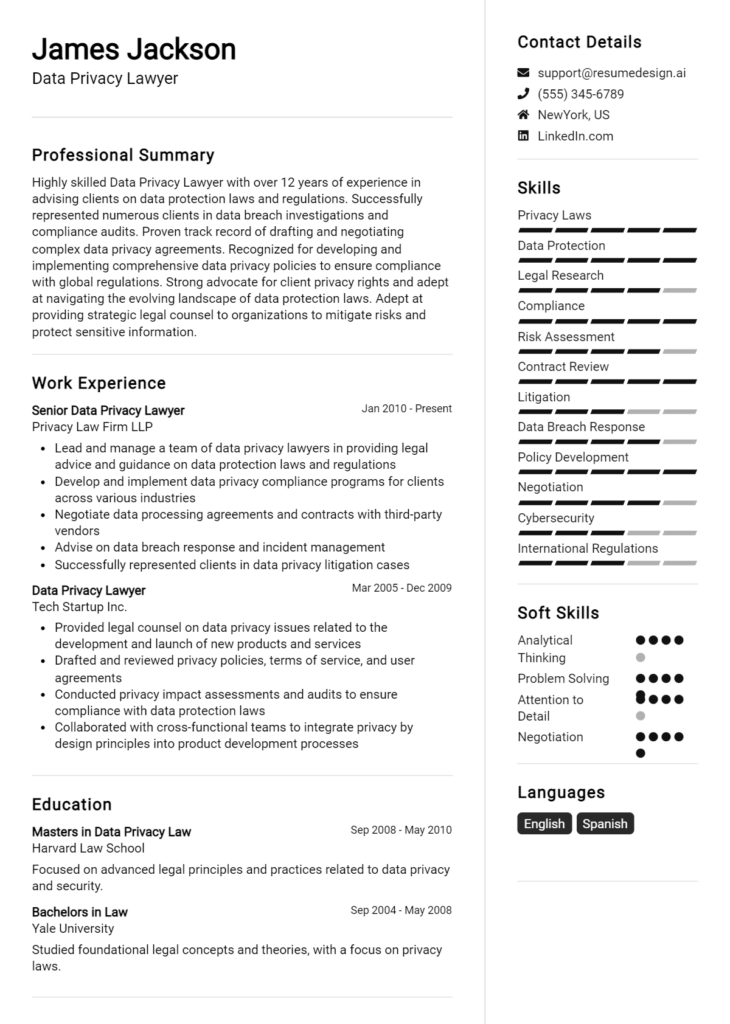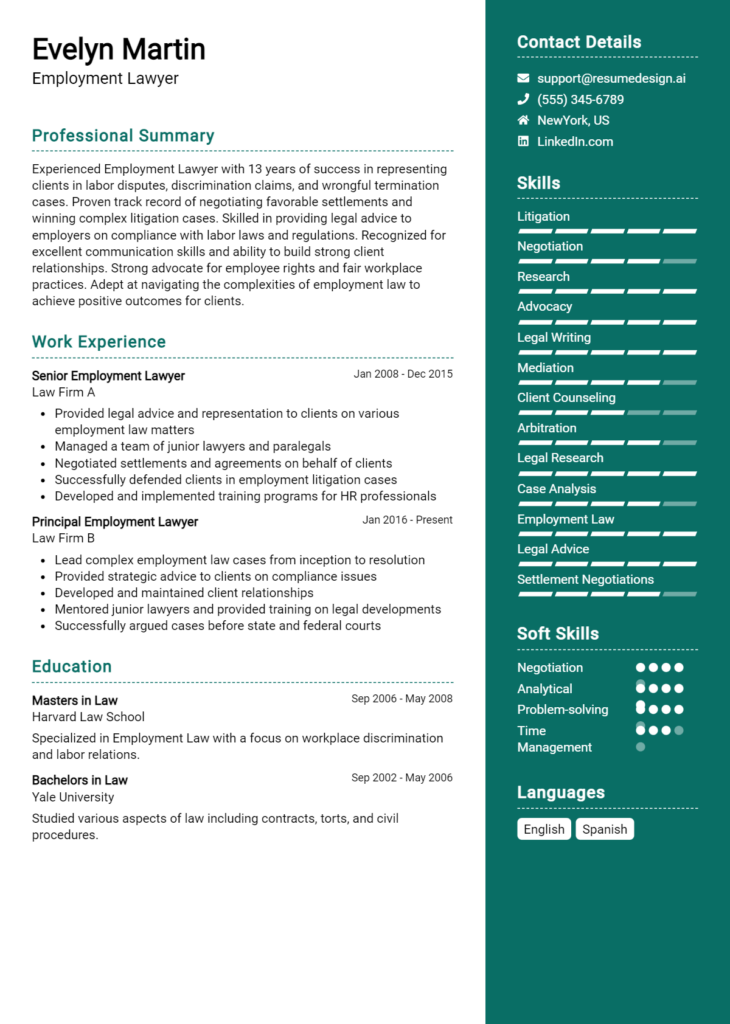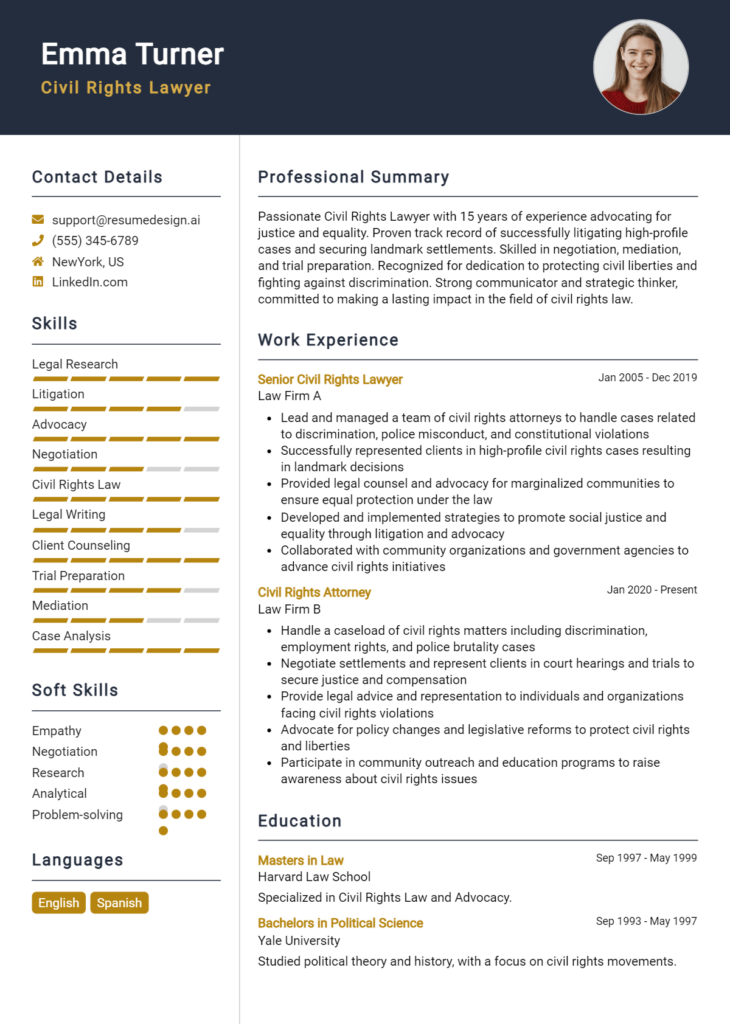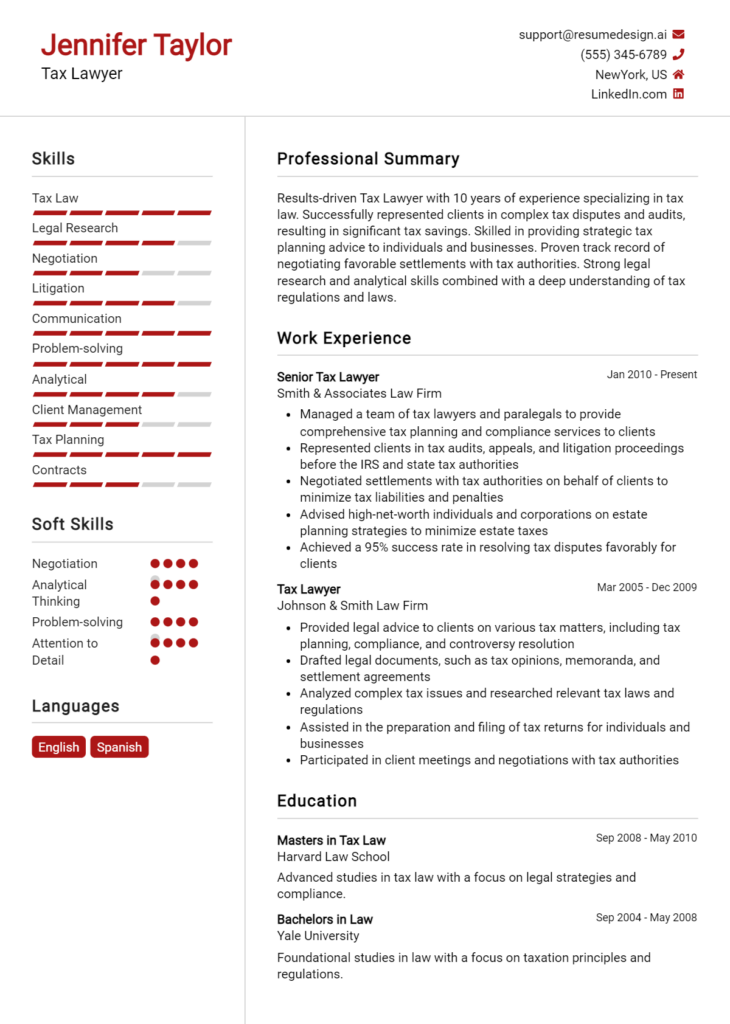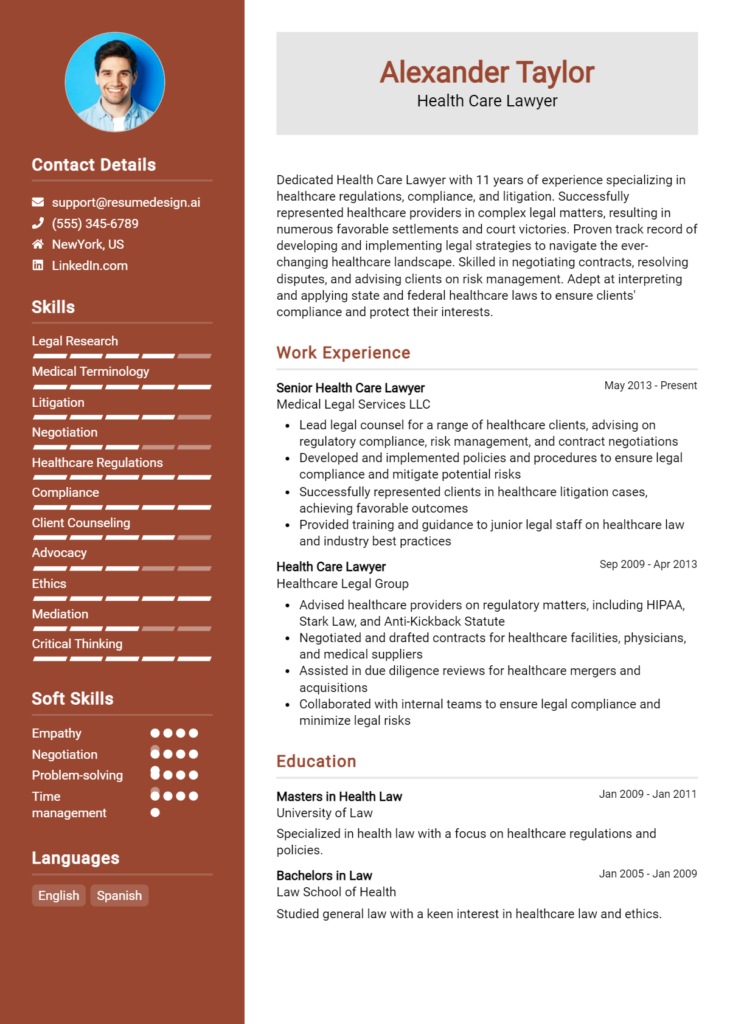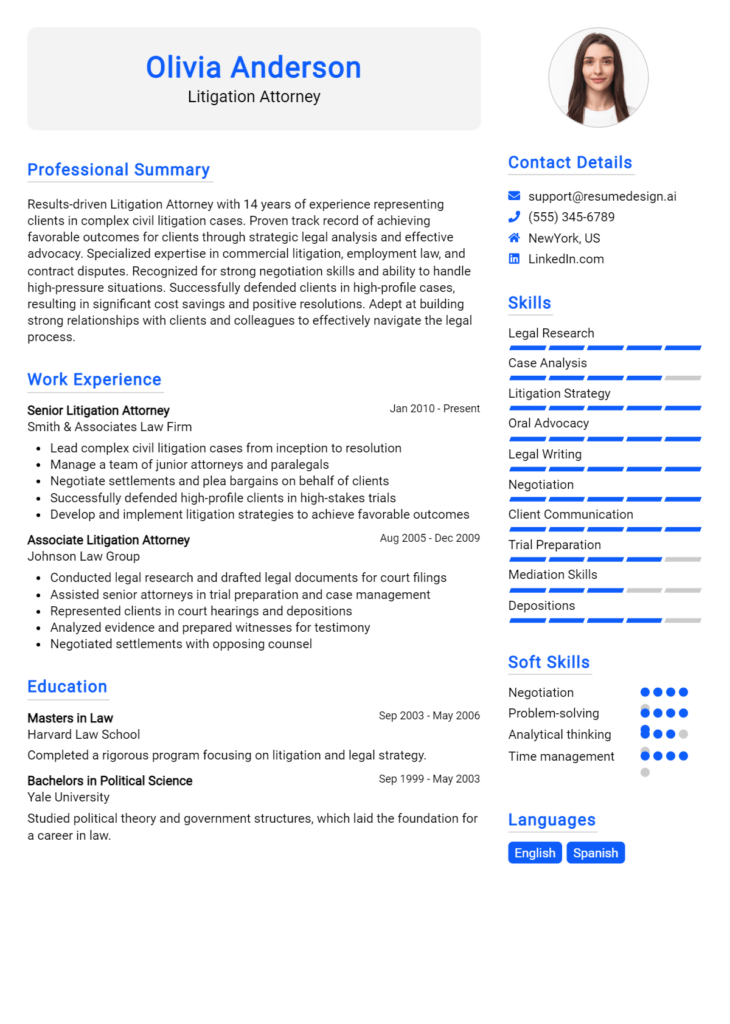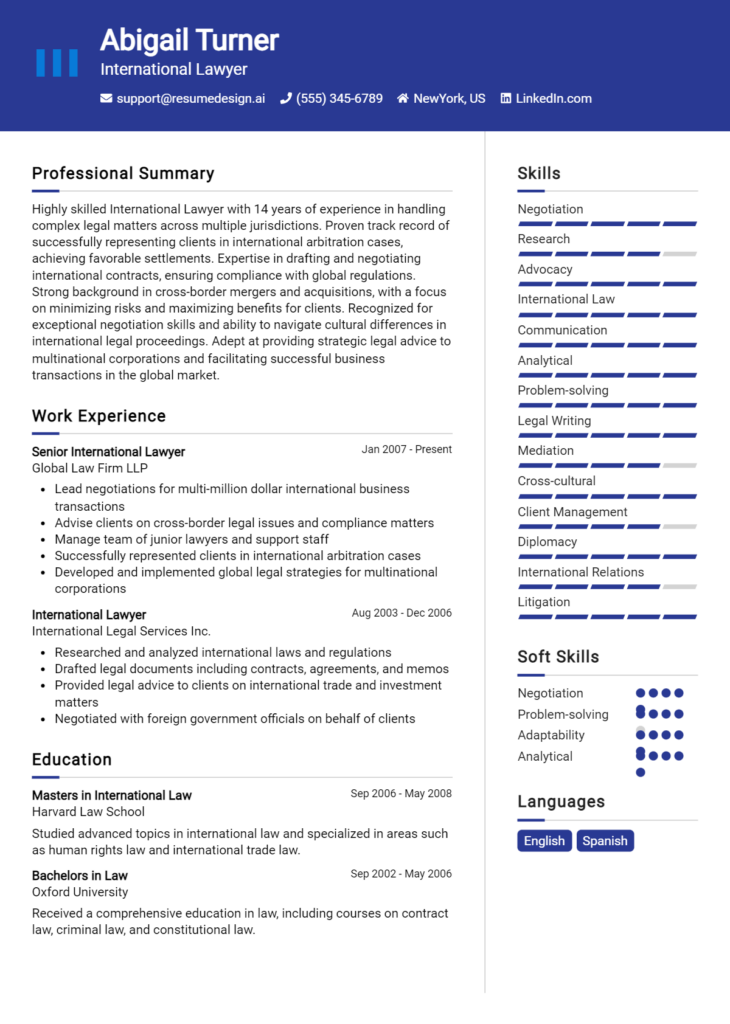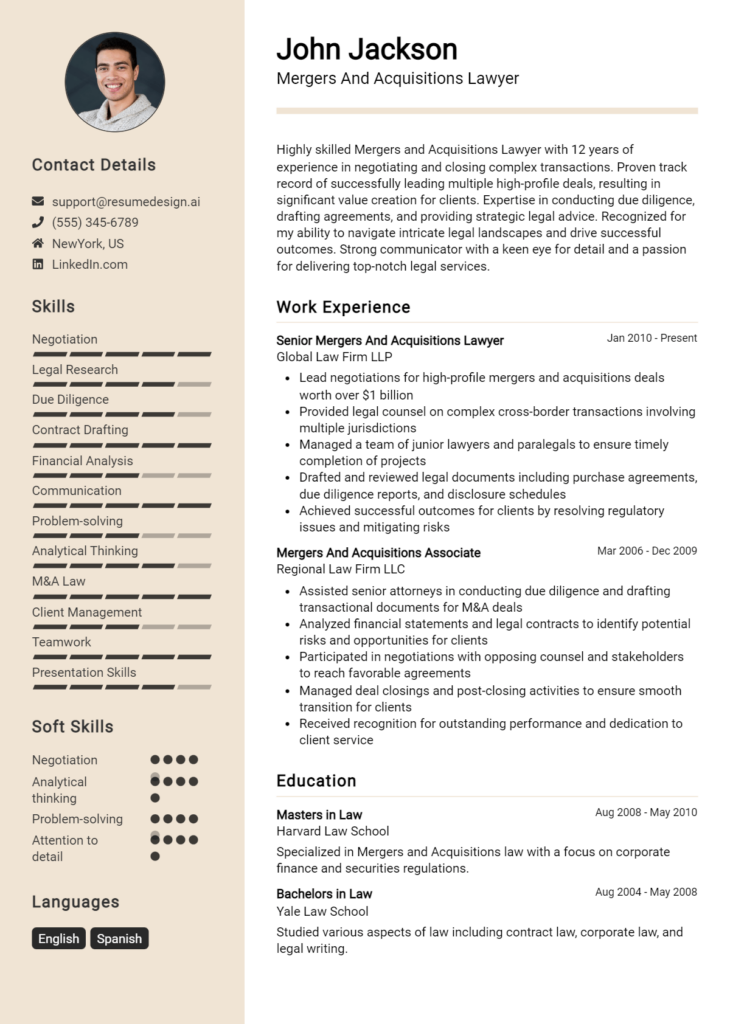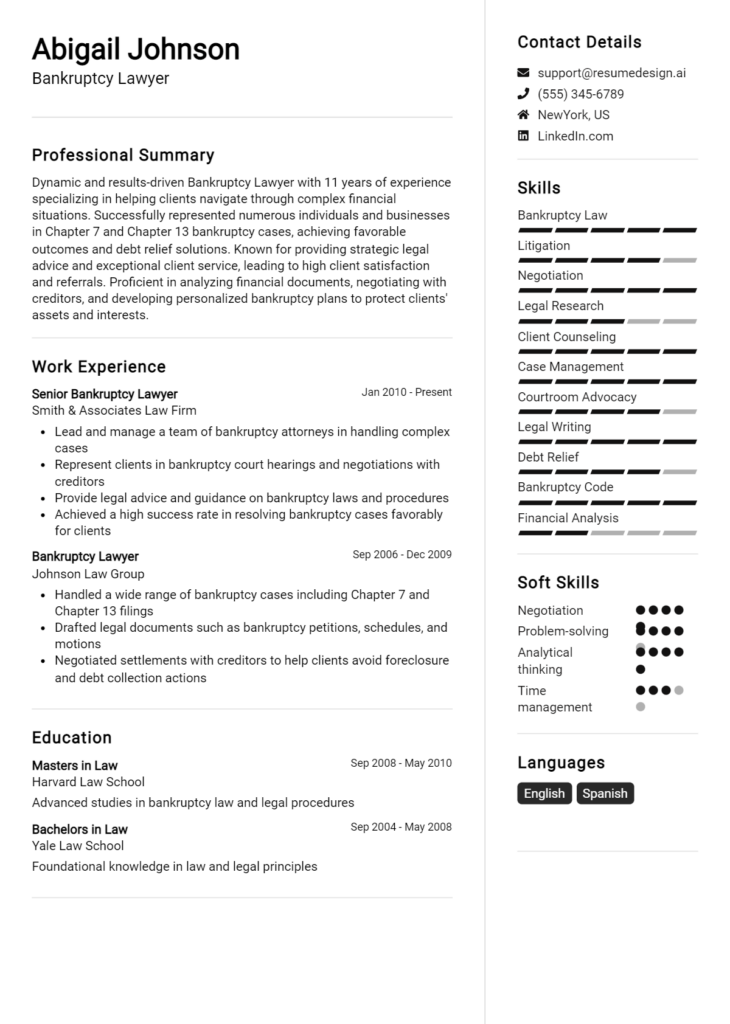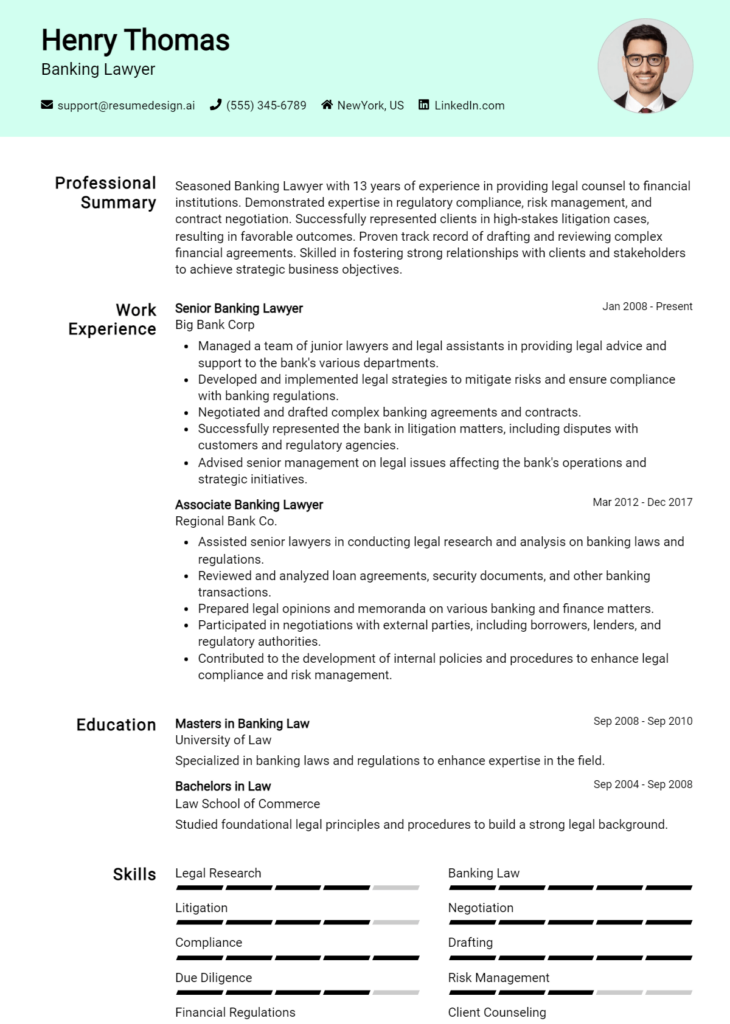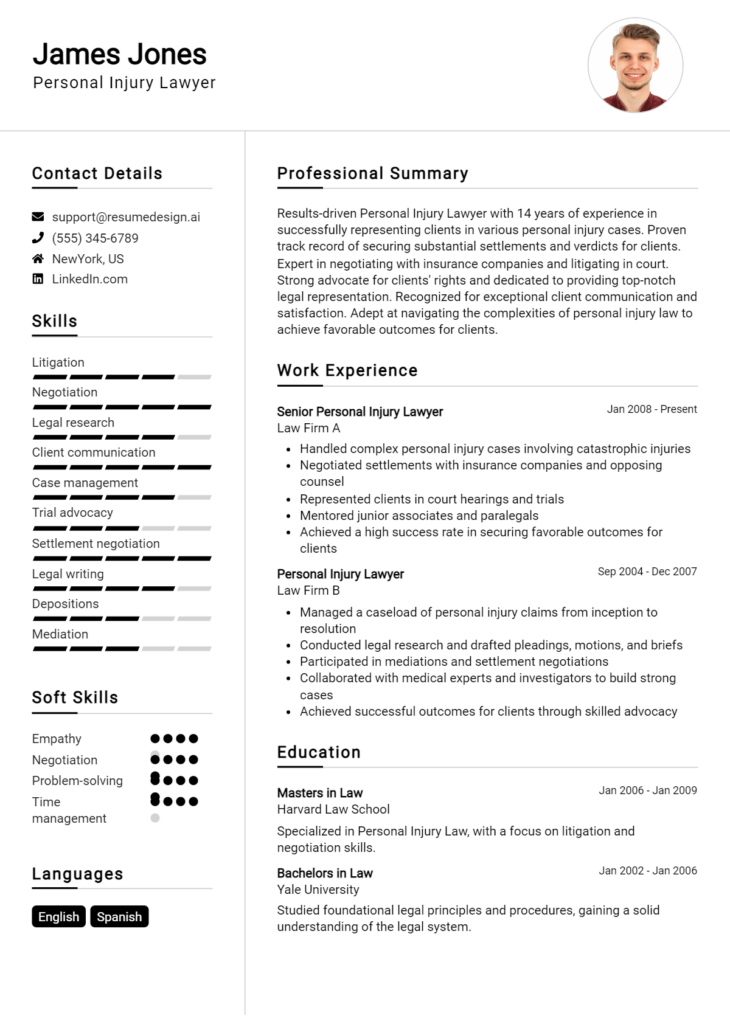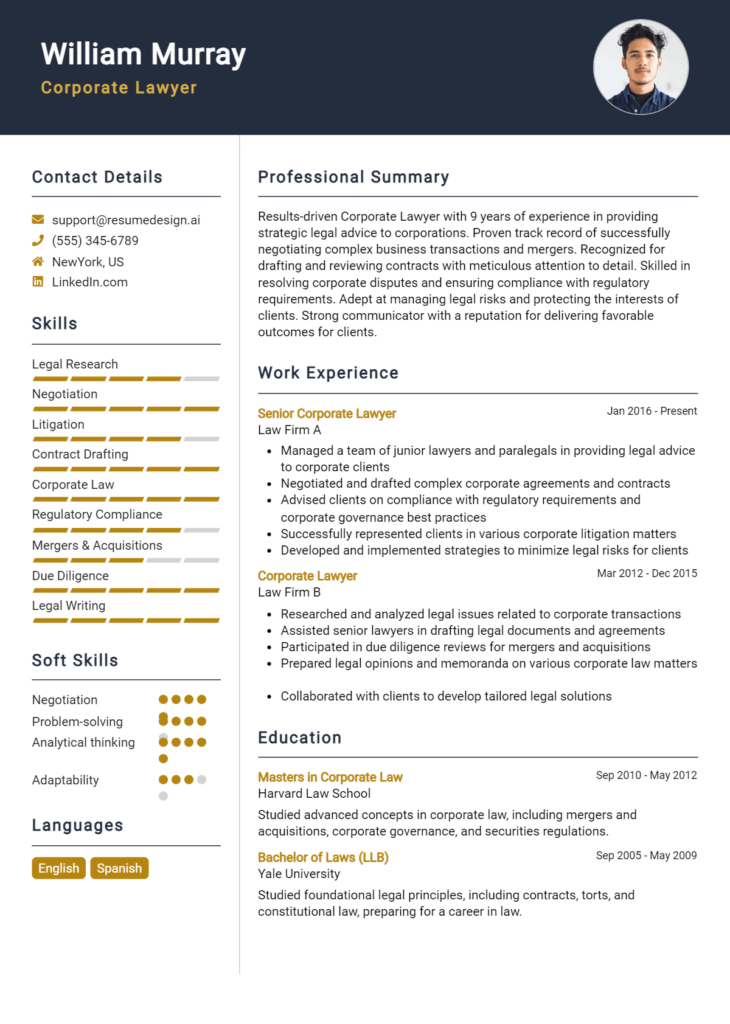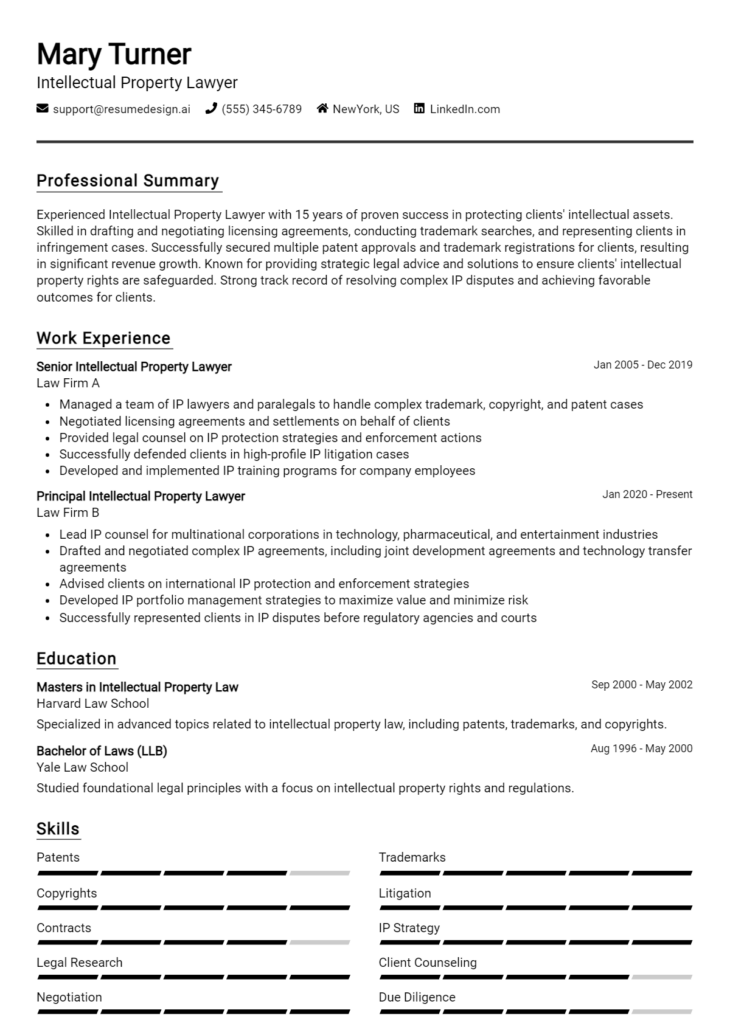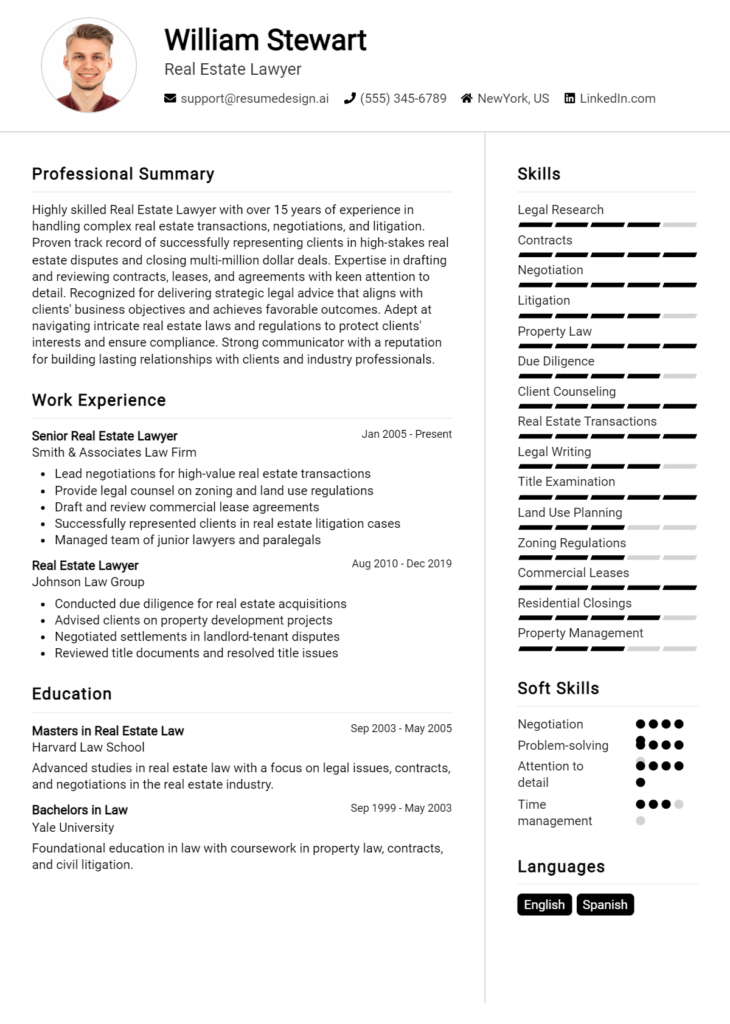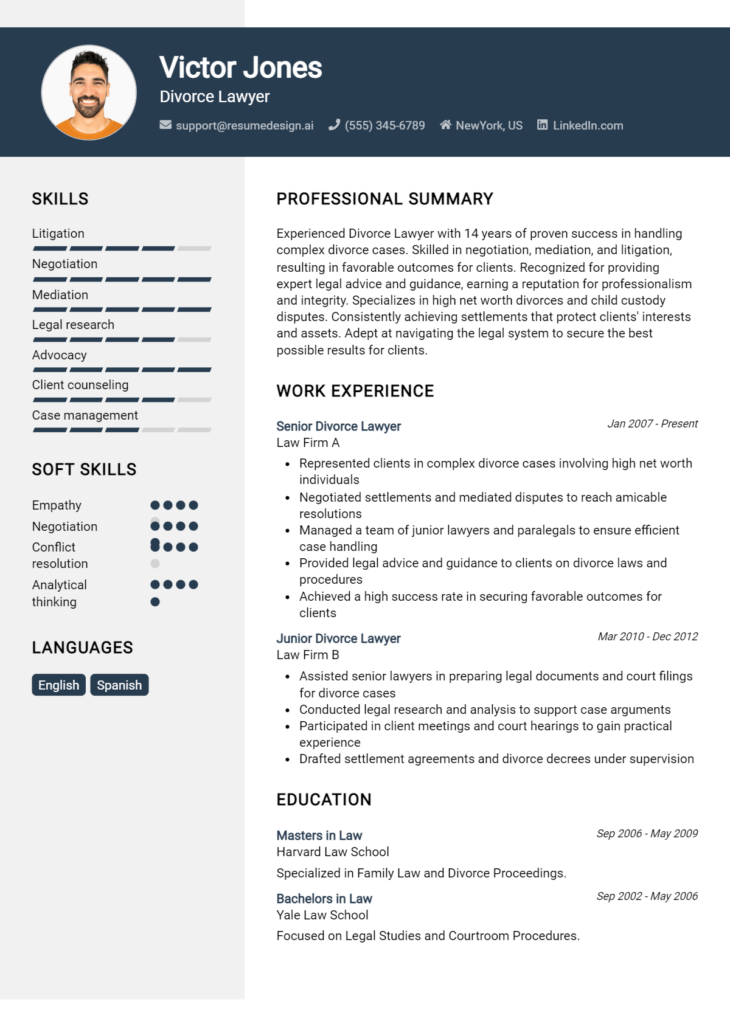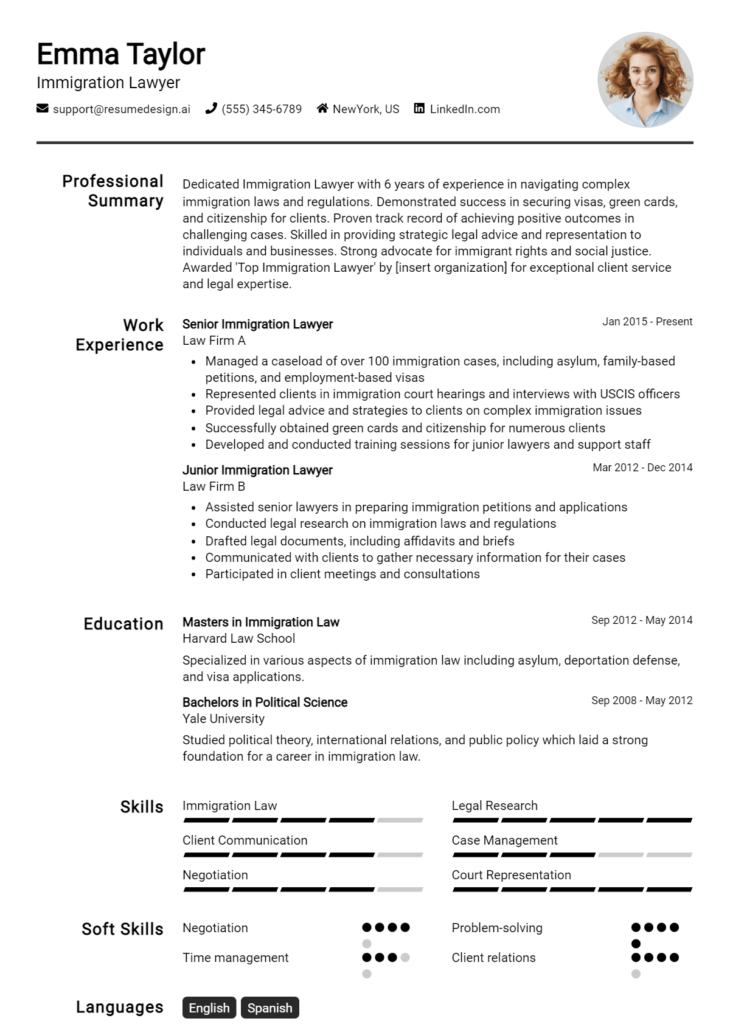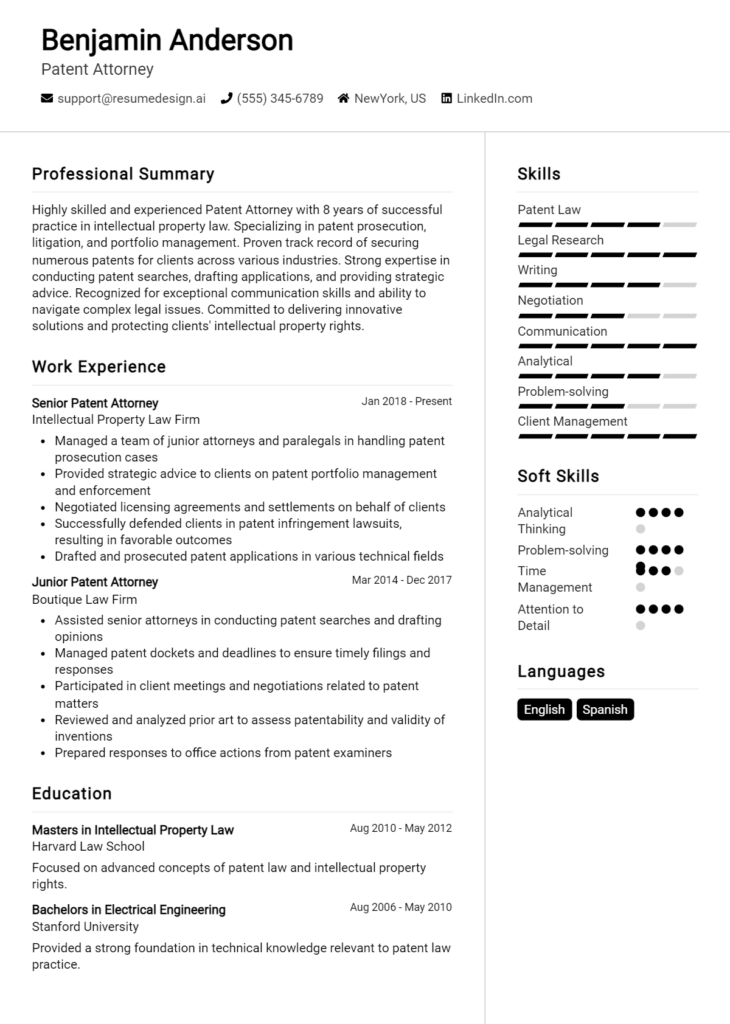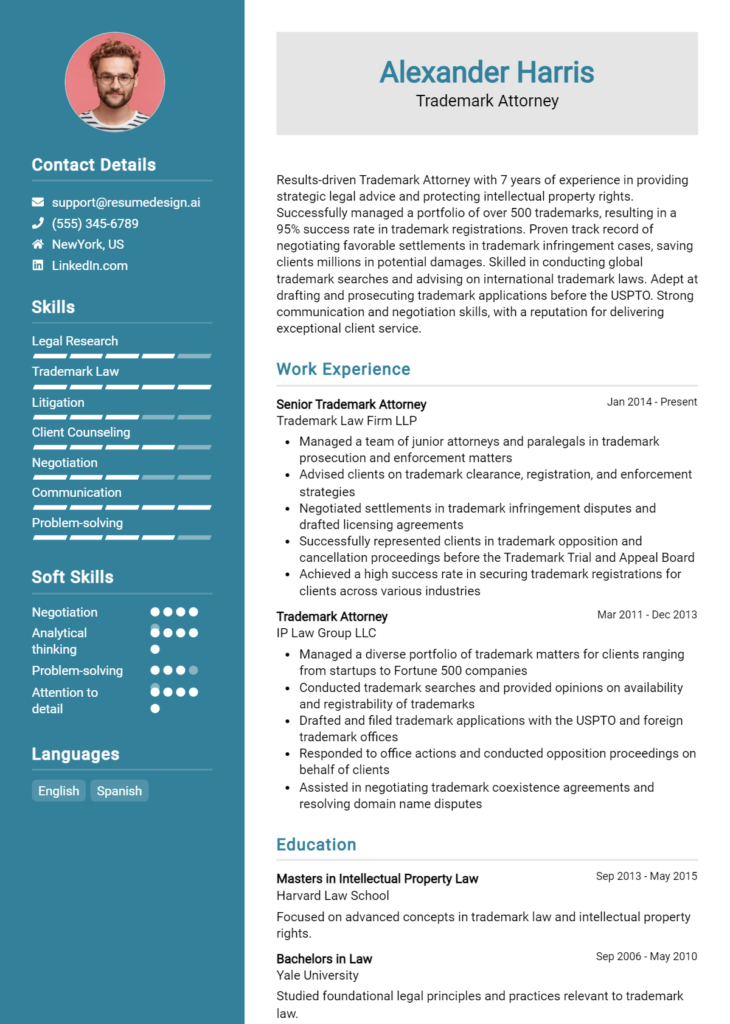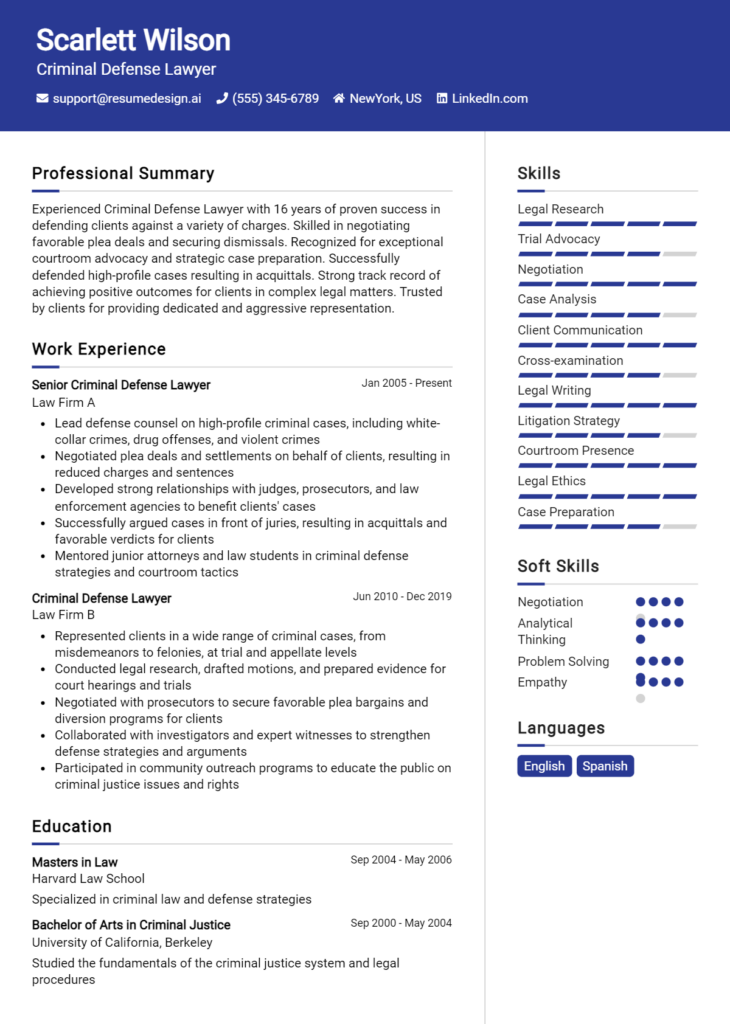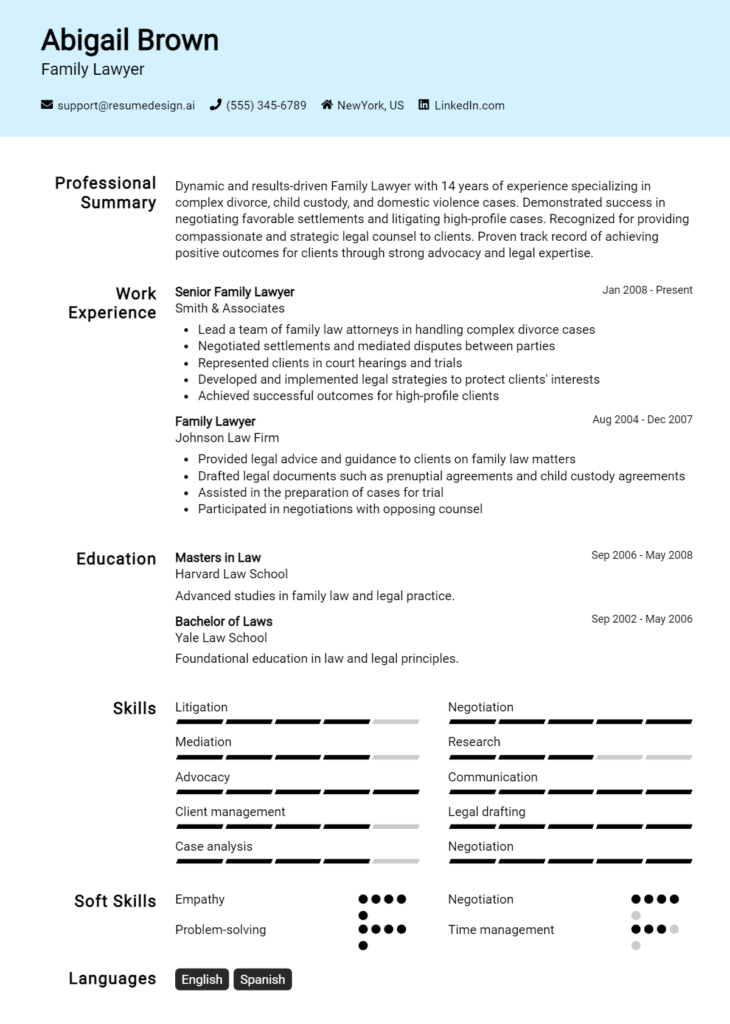Public Interest Lawyer Core Responsibilities
A Public Interest Lawyer plays a crucial role in advocating for social justice and community welfare, often bridging various departments such as legal, policy, and community outreach. Key responsibilities include researching legal issues, representing clients in court, and collaborating with non-profit organizations. Essential skills encompass technical legal knowledge, operational efficiency, and strong problem-solving abilities, which are vital for navigating complex cases. A well-structured resume effectively highlights these qualifications, contributing to the organization's overarching mission of promoting public interest.
Common Responsibilities Listed on Public Interest Lawyer Resume
- Conduct legal research and analysis on public interest issues.
- Represent clients in court and administrative hearings.
- Draft legal documents, including briefs and motions.
- Collaborate with community organizations to address legal needs.
- Advocate for policy changes at local, state, or national levels.
- Provide legal education and outreach to underserved populations.
- Participate in mediation and negotiation on behalf of clients.
- Prepare and review contracts and agreements.
- Monitor and report on legislative developments affecting public interest.
- Assist in grant writing and fundraising efforts for legal initiatives.
- Train and supervise legal interns and volunteers.
- Maintain accurate case files and documentation.
High-Level Resume Tips for Public Interest Lawyer Professionals
In the competitive field of public interest law, a well-crafted resume is not just a document; it is your first opportunity to make a lasting impression on potential employers. Given the unique nature of public interest work, your resume must effectively reflect your skills, experiences, and commitment to social justice. It should highlight your achievements in a way that resonates with hiring committees focused on making a difference in the community. This guide will equip you with practical and actionable resume tips specifically tailored for public interest lawyer professionals, ensuring you stand out in a crowded applicant pool.
Top Resume Tips for Public Interest Lawyer Professionals
- Tailor your resume to the job description by incorporating relevant keywords from the posting.
- Highlight your relevant experience in public interest law, including internships, volunteer work, and clinical experiences.
- Quantify your achievements whenever possible, using metrics to demonstrate your impact (e.g., "successfully represented 15 clients pro bono").
- Showcase your skills in legal research, writing, and advocacy, as these are crucial in public interest law.
- Include any specialized training or certifications that align with the organization's mission or focus area.
- Feature leadership roles in relevant organizations or initiatives that demonstrate your commitment to public service.
- Incorporate a section for publications or presentations if you have contributed to legal journals or spoken at events.
- Keep your resume concise and focused, ideally one page, ensuring clarity and readability.
- Use a professional format with clear headings and bullet points to make your resume easy to navigate.
- Include a compelling summary statement that encapsulates your passion for public interest law and your career objectives.
By implementing these tips, you can significantly enhance your resume, increasing your chances of landing a meaningful position in the public interest law field. A well-structured and targeted resume not only showcases your qualifications but also reflects your dedication to making a positive impact in society, making you a compelling candidate for potential employers.
Why Resume Headlines & Titles are Important for Public Interest Lawyer
In the competitive field of public interest law, crafting a resume that stands out is essential, and a powerful resume headline or title plays a pivotal role in achieving this. A strong headline can immediately grab the attention of hiring managers, providing a succinct summary of a candidate's key qualifications in a single impactful phrase. This element should be concise, relevant, and directly related to the specific job being applied for, making it easier for employers to identify the candidate's strengths and suitability for the role at a glance.
Best Practices for Crafting Resume Headlines for Public Interest Lawyer
- Keep it concise: Aim for one to two impactful phrases.
- Be role-specific: Tailor the headline to match the job description.
- Highlight key strengths: Focus on your most relevant skills and accomplishments.
- Use action words: Start with dynamic verbs to convey energy and proactivity.
- Incorporate relevant keywords: Use terms that align with the job posting to pass through applicant tracking systems.
- Showcase your passion: Reflect your commitment to public interest and social justice.
- Avoid clichés: Steer clear of overused phrases that fail to differentiate you.
- Consider the audience: Think about what hiring managers in public interest law prioritize in candidates.
Example Resume Headlines for Public Interest Lawyer
Strong Resume Headlines
Dedicated Public Interest Lawyer with 5+ Years of Advocacy Experience in Civil Rights
Passionate Environmental Attorney Committed to Sustainable Justice and Community Empowerment
Skilled Legal Advocate Specializing in Immigration Rights and Policy Reform
Weak Resume Headlines
Lawyer Looking for a Job
Experienced Professional Seeking Opportunities
The strong headlines are effective because they clearly convey the candidate's specific expertise and commitment to public interest law, making them memorable and impactful. In contrast, the weak headlines fail to impress as they are vague and generic, lacking the detail that would allow hiring managers to quickly assess the candidate's fit for the position. By focusing on relevant skills and experiences, strong headlines effectively draw the reader's attention and set the stage for a compelling resume.
Work Experience Section for Public Interest Lawyer Resume
The work experience section of a Public Interest Lawyer resume is pivotal as it serves as a comprehensive showcase of the candidate's technical skills, leadership abilities, and capacity to deliver high-quality legal outcomes. This section not only highlights the candidate's direct contributions but also demonstrates their proficiency in managing teams and collaborating effectively with diverse stakeholders. To stand out in a competitive field, it is essential to quantify achievements and align experiences with industry standards, thereby providing clear evidence of the candidate's impact and effectiveness in advancing public interest causes.
Best Practices for Public Interest Lawyer Work Experience
- Clearly outline specific legal skills relevant to public interest law, such as litigation, drafting legal documents, and negotiation.
- Quantify achievements with metrics, such as the number of cases won, clients served, or community programs initiated.
- Emphasize collaborative efforts by detailing teamwork experiences, including roles in multidisciplinary teams and partnerships with organizations.
- Use action verbs to describe responsibilities and accomplishments, enhancing the dynamism of the statements.
- Highlight any leadership roles undertaken, such as managing projects or mentoring junior staff.
- Tailor experiences to reflect alignment with the values and goals of public interest law organizations.
- Include relevant volunteer work or internships that showcase commitment to public service and social justice.
- Ensure clarity and conciseness in descriptions to maintain the reader's engagement.
Example Work Experiences for Public Interest Lawyer
Strong Experiences
- Successfully represented over 50 low-income clients in housing disputes, achieving a 90% favorable outcome rate, which led to increased access to safe housing for vulnerable populations.
- Led a pro bono initiative that resulted in the drafting and implementation of new legal aid policies, increasing funding by 30% and expanding services to underserved communities.
- Collaborated with a team of attorneys and social workers to develop a comprehensive legal support program for domestic violence survivors, resulting in a 40% increase in client engagement.
- Managed a volunteer team of 15 interns, providing training and supervision that improved case handling efficiency by 25% during high-demand periods.
Weak Experiences
- Worked on various legal cases without specific details on outcomes or responsibilities.
- Assisted with some community outreach programs but did not elaborate on impact or contributions.
- Participated in meetings and discussions related to legal matters, lacking clear evidence of leadership or results.
- Conducted research on legal issues without indicating how this research was utilized or its significance.
The strong experiences are considered impactful because they provide specific, quantifiable outcomes that demonstrate the candidate's effectiveness and leadership in public interest law. They clearly illustrate how the candidate's actions led to significant improvements and positive changes within communities. In contrast, the weak experiences lack detail and specificity, failing to convey any clear results or the candidate's role in achieving them, making them less compelling to potential employers.
Education and Certifications Section for Public Interest Lawyer Resume
The education and certifications section of a Public Interest Lawyer resume is crucial as it serves to showcase the candidate's academic background, relevant industry certifications, and dedication to continuous learning. This section not only highlights formal education but also emphasizes specialized training and coursework that are pertinent to public interest law. By providing detailed information about their qualifications, candidates can significantly enhance their credibility and demonstrate their alignment with the core responsibilities and values of the job role, making them more appealing to potential employers.
Best Practices for Public Interest Lawyer Education and Certifications
- Include relevant degrees such as Juris Doctor (JD) from accredited law schools.
- List certifications that are recognized in the public interest field, such as mediation or negotiation certifications.
- Highlight any specialized training in areas like civil rights, environmental law, or public policy advocacy.
- Provide details on relevant coursework that aligns with public interest issues, such as human rights law or community organizing.
- Be specific about the institution and the year of completion to show currency in education.
- Consider including academic honors or achievements, such as Dean's List or scholarships related to public service.
- Use a clear format to ensure easy readability and quick access to important information.
- Regularly update this section to reflect any ongoing education or new certifications acquired.
Example Education and Certifications for Public Interest Lawyer
Strong Examples
- Juris Doctor (JD), Harvard Law School, 2021
- Certification in Environmental Law, American Bar Association, 2022
- Coursework: Human Rights Law, Community Development, and Advocacy Strategies
- Mediation Certification, National Conflict Resolution Center, 2020
Weak Examples
- Bachelor of Arts in History, University of California, 1990 (not directly relevant)
- Certification in Real Estate Law, National Association of Realtors, 2018 (not aligned with public interest)
- Unaccredited online course in Legal Basics, 2021 (lacks credibility)
- High School Diploma, Springfield High School, 1985 (too basic for this role)
The strong examples are considered effective because they directly relate to the field of public interest law and demonstrate a commitment to relevant education and specialized training. They showcase advanced qualifications that align with the needs of potential employers. In contrast, the weak examples are deemed ineffective due to their lack of relevance to public interest law, outdated credentials, or insufficient rigor. These examples fail to establish the candidate's qualifications in a competitive job market.
Top Skills & Keywords for Public Interest Lawyer Resume
A well-crafted resume for a Public Interest Lawyer should highlight a blend of both hard and soft skills, reflecting the unique demands of the role. Public Interest Lawyers often represent marginalized communities and advocate for social justice, making it essential for them to communicate effectively, demonstrate empathy, and possess a solid understanding of legal principles. Including relevant skills not only showcases your qualifications but also signals to potential employers your readiness to tackle the challenges of the job. A strong emphasis on skills can set you apart from other candidates and make your resume more appealing. To enhance your chances of landing an interview, ensure that you tailor your skills section to match the specific requirements of the position you are applying for. For additional insights on how to effectively present your skills and work experience, consider exploring the resources available.
Top Hard & Soft Skills for Public Interest Lawyer
Soft Skills
- Empathy
- Communication Skills
- Negotiation Skills
- Critical Thinking
- Problem-Solving
- Cultural Competence
- Team Collaboration
- Adaptability
- Emotional Intelligence
- Client Advocacy
Hard Skills
- Legal Research
- Case Management
- Knowledge of Civil Rights Law
- Litigation Skills
- Drafting Legal Documents
- Public Speaking
- Familiarity with Administrative Law
- Understanding of Nonprofit Regulations
- Mediation Techniques
- Trial Preparation
Stand Out with a Winning Public Interest Lawyer Cover Letter
Dear [Hiring Manager's Name],
I am writing to express my strong interest in the Public Interest Lawyer position at [Organization Name], as advertised on [where you found the job posting]. With a Juris Doctor degree from [Your Law School] and over [X years] of experience advocating for marginalized communities, I am passionate about using the law as a tool for social justice. My background in [specific area of law, e.g., civil rights, environmental law, etc.] and my commitment to public service align perfectly with the mission of [Organization Name] to promote equity and access to legal resources.
During my tenure at [Previous Organization or Law Firm], I successfully managed a diverse caseload that included [briefly describe relevant cases or experiences]. I utilized strong research and negotiation skills to advocate for clients facing systemic injustices, achieving favorable outcomes in [specific examples, e.g., settlements, policy changes]. My work not only honed my legal acumen but also deepened my understanding of the challenges faced by underserved populations. I have collaborated with community organizations to raise awareness about legal rights, demonstrating my commitment to empowering individuals through education and advocacy.
I am particularly drawn to [Organization Name] because of your focus on [specific projects or initiatives of the organization]. I admire your dedication to [mention a specific value or mission of the organization], and I am eager to contribute my expertise in [specific skill or area of law relevant to the organization] to further these efforts. I believe that my proactive approach, combined with my strong interpersonal skills, will enable me to build meaningful relationships with clients and stakeholders alike, enhancing the impact of your vital work.
Thank you for considering my application. I look forward to the opportunity to discuss how my background, skills, and enthusiasm for public interest law can contribute to the important mission of [Organization Name].
Sincerely,
[Your Name]
[Your Contact Information]
Common Mistakes to Avoid in a Public Interest Lawyer Resume
When crafting a resume as a public interest lawyer, it's crucial to present your skills and experiences effectively to stand out in a competitive field. However, many candidates make common mistakes that can diminish their chances of landing an interview. Avoiding these pitfalls is essential to showcasing your dedication to social justice and your legal expertise. Here are some frequent mistakes to watch out for:
Generic Objective Statements: Using a vague or generic objective fails to convey your specific interest in public interest law. Tailor your objective to reflect your passion for social justice and the specific role you are applying for.
Neglecting Relevant Experience: Failing to highlight internships, volunteer work, or pro bono cases can overlook valuable experiences that demonstrate your commitment to public interest work. Ensure these experiences are prominently featured.
Overly Technical Language: Using legal jargon that may not be understood by hiring committees can alienate your audience. Aim for clear, concise language that communicates your qualifications effectively.
Ignoring the Importance of Soft Skills: Public interest law often requires strong interpersonal skills. Neglecting to include abilities such as empathy, communication, and teamwork can make your resume less compelling.
Lack of Quantifiable Achievements: Simply listing responsibilities without highlighting specific accomplishments can weaken your resume. Whenever possible, include metrics or outcomes that showcase your impact (e.g., "successfully advocated for 100+ clients").
Formatting Issues: A cluttered or unprofessional format can distract from the content of your resume. Use a clean, organized layout with consistent font sizes and bullet points to enhance readability.
Inadequate Tailoring for Each Application: Sending out a one-size-fits-all resume can hurt your chances. Customize your resume for each position, emphasizing the experiences and skills most relevant to the specific job description.
Omitting Continuing Education: Public interest law is an ever-evolving field, and neglecting to mention relevant courses, certifications, or workshops can signal a lack of commitment to professional growth. Include any additional training that enhances your qualifications.
Conclusion
As a Public Interest Lawyer, your role is pivotal in advocating for social justice, ensuring equitable legal representation, and addressing issues that affect marginalized communities. Throughout this article, we have explored the essential skills and qualifications necessary for a successful career in public interest law, including strong communication abilities, a deep understanding of legal principles, and a commitment to public service. We also highlighted the diverse career paths available within this field, from legal aid organizations to government agencies and non-profit institutions.
In conclusion, it’s crucial to present your experience and qualifications effectively in your resume to stand out in this competitive field. Take the time to review your Public Interest Lawyer resume, ensuring it reflects your passion for social justice and your relevant skills.
To assist you in this process, consider utilizing valuable resources such as resume templates, which can help structure your information attractively. A resume builder can simplify creating a professional-looking resume, while resume examples provide inspiration for showcasing your unique experiences. Additionally, don't overlook the importance of a well-crafted cover letter; browse through our cover letter templates to find one that complements your resume perfectly.
Now is the time to take action—revamp your resume and position yourself for success in your public interest law career!

